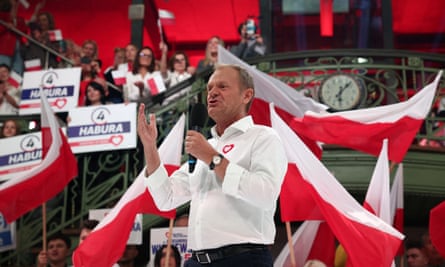
Rule of law declining across EU, report warns
Civil liberties network says in states where far-right parties influence power, rule-of-law deterioration risks becoming systemic
The rule of law is declining across the EU as governments continue to weaken legal and democratic checks and balances, a leading civil liberties network has said, highlighting in particular a sharp rise in restrictions on the right to protest.
Berlin-based Liberties said in its annual report, compiled with 37 rights groups in 19 countries, that in older democracies with mainstream parties in government, such as France, Germany and Belgium, challenges to the rule of law remained sporadic.
However, in similarly long-established – so resilient – democracies where far-right parties are in power, or influencing power, such as Italy and Sweden, Liberties said deterioration of the rule of law, while gradual, risked becoming systemic.
In more recently re-established EU democracies, such as Slovakia, Slovenia and Poland, it said the rule of law “can swing rapidly – either towards recovery or decline”.
Balázs Dénes, the executive director of the Civil Liberties Union for Europe, as Liberties is formally known, said its 600-page report – used by the European Commission in its rule-of-law monitoring – showed the EU needed to act faster against clear rule-of-law backsliding.
“The bottom line is that the commission, the entire EU, are sitting on a very powerful toolbox but they are reluctant to use it quickly and assertively,” Dénes said. “We are alarmed by the lack of serious analysis of what is actually going on in some places.”
Measures such as infringement proceedings or conditional freezing of EU funds could and should be deployed, he said, but Brussels was “like a bystander. They fail to realise some governments are deliberately destroying checks and balances.”
The case of Hungary, where now-systemic rule-of-law issues remain unresolved despite some legislative change, underlined “just how badly things can turn”, Dénes said, “to the extent it is now serving as an inspiration to the likes of Fico”.
In France, the report said, last year’s pension changes were “enacted in a manifestly undemocratic legislative process” after the government used special constitutional powers, while journalists in Germany now faced criminal prosecution if they published judicial decisions that are not publicly accessible.
In Italy and Sweden, whose governments are respectively led and propped up by far-right parties, Liberties’ partners reported rule-of-law regression in areas including the justice system, media freedom and pluralism, civic space and human rights.
In Slovakia, a populist prime minister, Robert Fico, was “systematically dismantling democratic structures”, while in neighbouring Slovenia, a pro-democracy government was working to reverse sustained efforts by its populist predecessor to undermine democratic norms.
Poland, whose new government was battling to restore liberal democracy after eight years of populist state capture, highlighted “the challenge of restoring rule of law without breaking the very legal foundations one seeks to revive”, Liberties said.
Slovakia’s Fico has said proposed overhauls, including scrapping a special prosecutor’s office dealing with high-level corruption, are necessary to end bias against his Smer-SSD party, but critics say the changes will protect his political and business allies.
Poland’s new prime minister, Donald Tusk, has promised to restore EU norms to unblock tens of billions in funding held back by Brussels over charges of democratic backsliding during eight years of rule by the nationalist Law & Justice party.

The new government’s early efforts to evict loyal nationalists from key roles and restore neutrality in the judiciary, media and other key state bodies, however, have been criticised as illegal by PiS leaders, with some legal experts also raising doubts.
Dénes said a clear indication of a government’s direction of travel was its approach to the civic space, and particularly its treatment of civil rights and other NGOs. “Even countries like France and Germany are limiting this space,” he said.
after newsletter promotion
“Fico said days after his election he would be coming for NGOs, and in Sweden the [far-right] Sweden Democrats began attacking them too, as soon as the government they’re supporting was formed. It’s a strong indicator of respect for the rule of law.”
Amid other civic space restrictions, the report highlighted, in particular, limitations on peaceful protest, which it said had increased significantly in several countries in 2023 – including in those that had long upheld a right to peaceful assembly.
Belgium, Bulgaria, the Czech Republic, Estonia, Germany, Hungary and Sweden all introduced protest bans, often over the Israel-Gaza conflict, Liberties said, with some also restricting free speech, notably regarding pro-Palestinian messages or symbols.
Climate protesters were also singled out by authorities, especially in western European countries such as Belgium, Germany, Italy and Sweden, the report said, with arrests and prosecutions for non-violent protests common and increasing.
In its media freedom chapter, the report said concentration of media ownership was a concern in many member states, as were verbal and physical attacks on journalists, recorded in 2023 in 10 EU member states including France, Germany and Sweden.
On human rights violations, Liberties said the disregard of the rights of refugees and migrants remained “a dire issue” among EU member states, with so-called pushbacks legalised in many instances and the rights of unaccompanied minors regressing.
It described justice systems as “politicised, underfunded and unfair”, saying while countries such as Sweden had taken steps to depoliticise judicial selection processes, politicisation remained a risk in France, Germany, Greece, Hungary and Slovakia.
In Germany, Belgium, the Czech Republic and Slovakia, accountability mechanisms could in theory allow “the exercise of political pressure by the executive branch over judges” – especially if extremist parties were to come to power, it warned.
In Greece, Italy and Slovakia, politicians openly criticised court decisions or gave instructions in ongoing cases, while governments’ refusal to comply with rulings in asylum and border protection cases reached record highs in Greece and Belgium.
Source: theguardian.com



